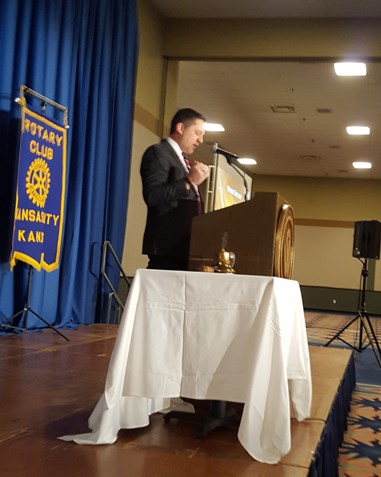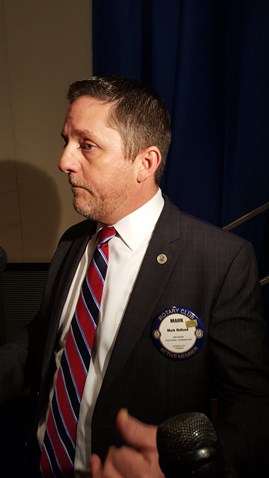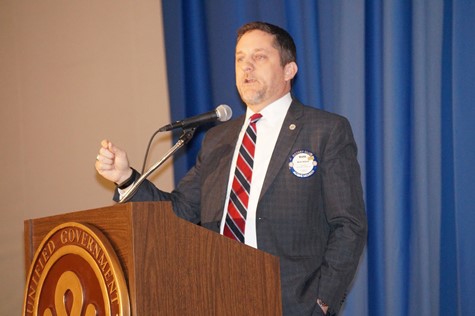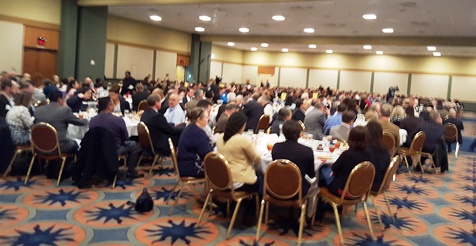
by William Crum
Unified Government Mayor Mark Holland today emphasized a long-term vision, with no quick fixes, for making progress in Wyandotte County.
The mayor, in his state of the government speech, named specific accomplishments during the past year, including many in economic development. It was the 50th annual state of the government speech in Kansas City, Kan.
“We have to stay on the path of aggressively pursuing economic development and supporting projects that will benefit the community for 50 years, not for five,” he said about economic development.
Among the accomplishments he mentioned were luxury apartments in the Village West area, a new auto mall near 98th and Parallel Parkway, the Dairy Farmers of America complex in that area, and new youth soccer fields to be built in the same area.
Mayor Holland noted that in the Fairfax industrial district of Kansas City, Kan., more than $2 billion was invested in the General Motors plant. Because it is bringing suppliers closer, there is more than 1 million square feet of manufacturing space under construction now in the Fairfax district, he said. CertainTeed there has a $30 million expansion, and Mark 1 Electric is buying older warehouses and fixing them up.
Investment in the Rosedale area of Kansas City, Kan., led by the University of Kansas Hospital and the KU Medical Center with other development nearby, will result in $350 million in new construction and 900 new jobs, the mayor said. KU continues to be the city’s largest employer, with more than 10,000 employees after the expansion.
“In the last three years alone, Wyandotte County has seen an unprecedented $2 billion in economic investment,” Mayor Holland said. “Our Unified Government staff, Wyandotte County Economic Development Council, the Board of Public Utilities and the state of Kansas continue to join forces to make these investments happen. This level of development doesn’t happen overnight – it takes long-term vision and community-wide collaboration.”
Mayor Holland said his theme today was about leadership, collaboration and sustainability.
The mayor also talked about redevelopment underway at Indian Springs shopping center. The old mall at 47th and State Avenue is in the process of being torn down, and Lane 4 is working on some redevelopment plans there.
Mayor Holland reiterated his long-term vision statement. “What we do at Indian Springs will be there for 50 years, so we need to do that right,” he said. If they wanted to build a large truck stop, they could do it today. Or if they wanted to build a warehouse, they could do that – but that isn’t what they want.
“We need to bring some retail to Indian Springs, and that is worth waiting for,” he said.
The mayor also pointed out that a new master plan for the northeast area of Kansas City, Kan., from north of State Avenue to the Quindaro area, is being developed. He said it was critically important and he hopes to get it in the budget.
And for downtown Kansas City, Kan., he announced that Memorial Hall would be the new home for roller derby in the metropolitan area.
As for the downtown Healthy Campus plan, Mayor Holland said, “If it were easy, we would already have done it and taken credit for it.”
He said he expected an announcement “sooner than later” about a grocery store downtown, and that they are looking at property acquisition.
A community center for the downtown Healthy Campus has had a request for proposals done for an architect, and the plans will be presented to prospective donors. The Healthy Campus will be the biggest project in downtown Kansas City, Kan., in a long time, he said.
A project management team was hired through a grant to advance the Healthy Campus project.
He also discussed a $2 million planning grant the UG is applying for to provide mixed-use affordable housing in the downtown area.
In addition, the UG is in the process of selling the downtown Hilton Garden Inn, which should generate $2 million to put back into the convention center, he said.
The UG also recently sold the Legends 14 theater to AMC, and the theater will be renovated, he added.
Small business development is being enhanced by some new programs, including the small business incentive program last year, Mayor Holland said.
The mayor also discussed the results of some studies that have been done, including the public safety task force diversity recommendations that were adopted last summer. That will help make jobs available to more community members.
Mayor Holland also discussed programs to increase transparency, including the OpenGov website with budget information, live-streaming of UG commission meetings, and the UG’s 311 system upgrade.
He also said by passing the Tobacco 21 initiative, Kansas City, Kan., was helping to make sure high school students had less exposure to tobacco.
The mayor went over the history of the county’s population loss and white flight from 1970 to 2000, when it lost about 20 percent of its population and left some vacant homes behind.
He pointed out the difference between the tax base in Wyandotte County and Johnson County. Wyandotte County has a total valuation of $1 billion, while Johnson County’s is $8 billion, he said. Median homes here are valued less than $70,000, while Johnson County’s median is $210,000. Services, police, street maintenance all cost the same in both places, however.
“We have to grow the value of our city to reduce taxes and prosper,” Mayor Holland said.
He advocated keeping property taxes low through these methods: aggressive economic development with long-term vision; shifting the tax burden from property to sales tax as the STAR bonds are paid off at Village West; making the local government more efficient through curbing spending; and reducing blight.
“The good news is that in the last 20 years this community has begun to turn itself around, but it will take continued collaboration and vision that isn’t derailed by a quick-fix mentality,” Mayor Holland said.
The mayor made his remarks at the downtown Kansas City, Kan., Rotary Club meeting with about 450 in attendance at the Reardon Convention Center in downtown Kansas City, Kan. It was the 50th annual state of the government speech, and also the 100th anniversary of the downtown Rotary Club.



